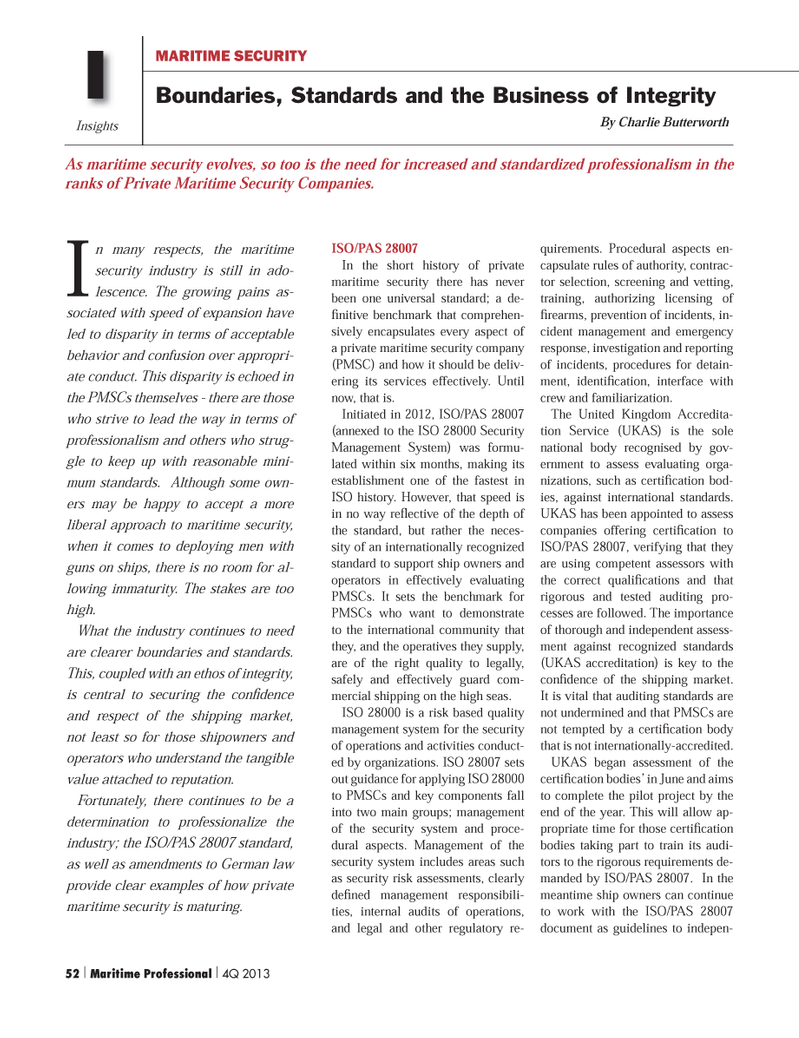
Page 52: of Maritime Logistics Professional Magazine (Q4 2013)
Shipbuilding, Repair
Read this page in Pdf, Flash or Html5 edition of Q4 2013 Maritime Logistics Professional Magazine
ISO/PAS 28007 In the short history of private maritime security there has nev er been one universal standard; a de- Þ nitive benchmark that comprehen- sively encapsulates every aspect of a private maritime security company (PMSC) and how it should be deliv- ering its services effectively. Until now, that is. Initiated in 2012, ISO/PAS 28007 (annexed to the ISO 28000 Security Management System) was formu- lated within six months, making its establishment one of the fastest in ISO history. However, that speed is in no way reß ective of the depth of the standard, but rather the neces- sity of an internationally recognized standard to support ship owners and operators in effectively evaluating PMSCs. It sets the benchmark for PMSCs who want to demonstrate to the international community that they, and the operatives they supply, are of the right quality to legally, safely and effectively guard com- mercial shipping on the high seas.ISO 28000 is a risk based quality management system for the security of operations and activities conduct- ed by organizations. ISO 28007 sets out guidance for applying ISO 28000 to PMSCs and key components fall into two main groups; management of the security system and proce-dural aspects. Management of the security system includes areas such as security risk assessments, clearly deÞ ned management responsibili- ties, internal audits of operations, and legal and other regulatory re- quirements. Procedural aspects en-capsulate rules of authority, contrac- tor selection, screening and vetting, training, authorizing licensing of Þ rearms, prevention of incidents, in- cident management and emergency response, investigation and reporting of incidents, procedures for detain-ment, identiÞ cation, interface with crew and familiarization. The United Kingdom Accredita- tion Service (UKAS) is the sole national body recognised by gov- ernment to assess evaluating orga- nizations, such as certiÞ cation bod- ies, against international standards. UKAS has been appointed to assess companies offering certiÞ cation to ISO/PAS 28007, verifying that they are using competent assessors with the correct qualiÞ cations and that rigorous and tested auditing pro-cesses are followed. The importance of thorough and independent assess-ment against recognized standards (UKAS accreditation) is key to the conÞ dence of the shipping market. It is vital that auditing standards are not undermined and that PMSCs are not tempted by a certiÞ cation body that is not internationally-accredited. UKAS began assessment of the certiÞ cation bodiesÕ in June and aims to complete the pilot project by the end of the year. This will allow ap- propriate time for those certiÞ cation bodies taking part to train its audi-tors to the rigorous requirements de-manded by ISO/PAS 28007. In the meantime ship owners can continue to work with the ISO/PAS 28007 document as guidelines to indepen-InsightsMARITIME SECURITY Boundaries, Standards and the Business of Integrity IBy Charlie Butterworth As maritime security evolves, so too is the need for increased and standardized professionalism in the ranks of Private Maritime Security Companies.In many respects, the maritime security industry is still in ado-lescence. The growing pains as- sociated with speed of expansion have led to disparity in terms of acceptable behavior and confusion over appropri- ate conduct. This disparity is echoed in the PMSCs themselves - there are those who strive to lead the way in terms of professionalism and others who strug- gle to keep up with reasonable mini- mum standards. Although some own- ers may be happy to accept a more liberal approach to maritime security, when it comes to deploying men with guns on ships, there is no room for al- lowing immaturity. The stakes are too high.What the industry continues to need are clearer boundaries and standards. This, coupled with an ethos of integrity, is central to securing the conÞ dence and respect of the shipping market, not least so for those shipowners and operators who understand the tangible value attached to reputation. Fortunately, there continues to be a determination to professionalize the industry; the ISO/PAS 28007 standard, as well as amendments to German law provide clear examples of how private maritime security is maturing. 52 | Maritime Professional | 4Q 2013MP #4 50-63.indd 52MP #4 50-63.indd 5212/11/2013 2:06:36 PM12/11/2013 2:06:36 PM

 51
51

 53
53
